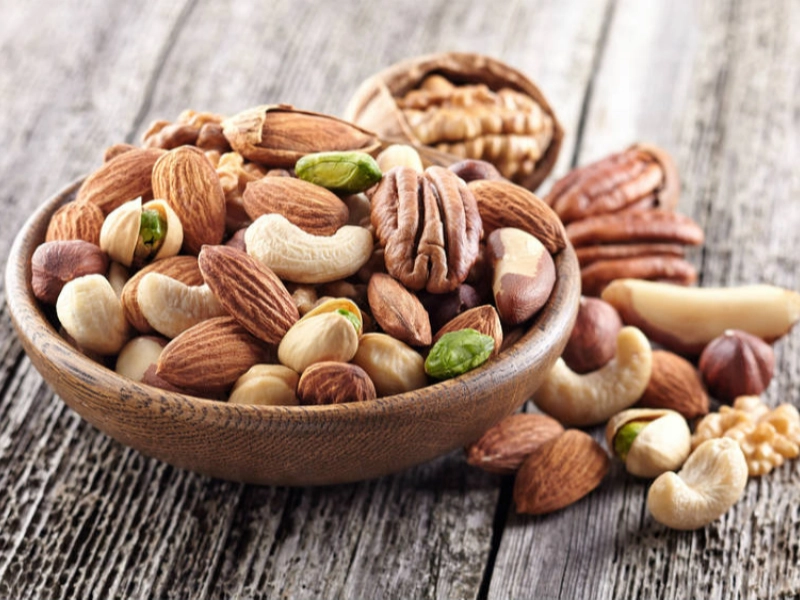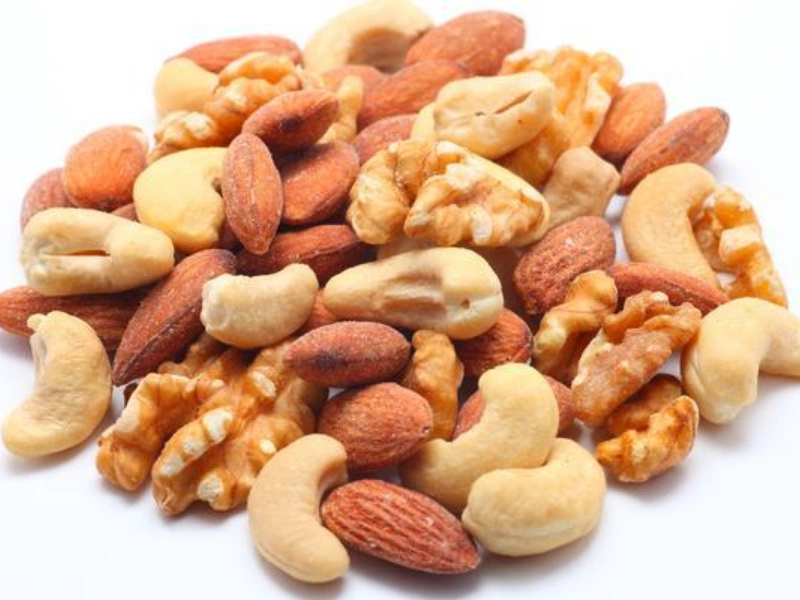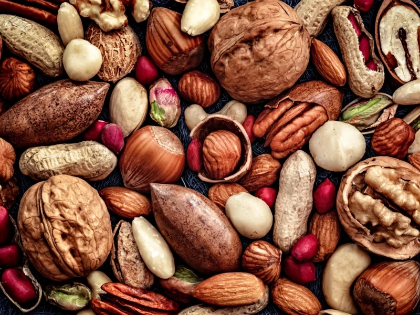Nuts: The Superfood of Nutrition
Nuts have been demonstrated to regulate blood sugar, lower "bad" cholesterol, and cut the risk of heart disease, making them an essential component of a balanced diet. They are rich in omega-3 fats, protein, vitamin E, and folic acid. For breakfast, toss a small handful into a bowl of yoghurt or cereal; for lunch, incorporate them into your vegetarian salad.
1. Rich in Protein

2. Rich in Fibre
 Nuts are tasty tiny packets full of minerals like calcium, potassium, magnesium, iron, and zinc, as well as heart-healthy unsaturated fats, protein, and vitamin E. Thanks to alpha-linolenic acid, a plant-based omega-3 fatty acid, they also provide a vegetarian supply of omega-3 fats (ALA).
In observational studies, eating nuts is linked to a lower body mass index, waist circumference, and systolic blood pressure—risk factors for chronic illnesses. Additionally, the fats in nuts have less of an effect on cholesterol and are easier to digest than the fats in animal products.
A small amount of nuts can make a satisfying snack and help you feel less hungry and satiated. To balance the calories, just be sure to eat them in little portions and combine them with other foods.
Nuts are tasty tiny packets full of minerals like calcium, potassium, magnesium, iron, and zinc, as well as heart-healthy unsaturated fats, protein, and vitamin E. Thanks to alpha-linolenic acid, a plant-based omega-3 fatty acid, they also provide a vegetarian supply of omega-3 fats (ALA).
In observational studies, eating nuts is linked to a lower body mass index, waist circumference, and systolic blood pressure—risk factors for chronic illnesses. Additionally, the fats in nuts have less of an effect on cholesterol and are easier to digest than the fats in animal products.
A small amount of nuts can make a satisfying snack and help you feel less hungry and satiated. To balance the calories, just be sure to eat them in little portions and combine them with other foods.
3. Minimal calorie intake
 Nuts are rich in good fats, protein, dietary fibre, and antioxidants. They have little sodium as well.
Three to seven grammes of protein, one to two grammes of fibre, and 160 to 200 calories can be found in one ounce of nuts. This substantial snack can support dieters in sticking to their dietary restrictions.
Additionally, they lessen appetite, which lowers food intake and prevents weight gain. They are also a fantastic source of L-arginine, an amino acid that is needed to make nitric oxide, a naturally occurring vasodilator. Along with vitamin E and folic acid, a few ounces of nuts can also supply a good quantity of heart-healthy monounsaturated fat. They also include minerals like potassium, magnesium, and iron.
Nuts are rich in good fats, protein, dietary fibre, and antioxidants. They have little sodium as well.
Three to seven grammes of protein, one to two grammes of fibre, and 160 to 200 calories can be found in one ounce of nuts. This substantial snack can support dieters in sticking to their dietary restrictions.
Additionally, they lessen appetite, which lowers food intake and prevents weight gain. They are also a fantastic source of L-arginine, an amino acid that is needed to make nitric oxide, a naturally occurring vasodilator. Along with vitamin E and folic acid, a few ounces of nuts can also supply a good quantity of heart-healthy monounsaturated fat. They also include minerals like potassium, magnesium, and iron.
4. Rich in Fatty Acids Omega-3
 Nuts are a fantastic source of heart-healthy lipids that raise good HDL cholesterol while lowering bad cholesterol and triglycerides. They also offer a variety of vitamins and minerals in addition to protein, which is an essential part of a balanced diet.
Nuts are also a great source of omega-3 fatty acids, especially ALA (alpha-linolenic acid), which lowers lipid and high blood pressure, two risk factors for cardiovascular disease.
Remember that nuts are high in calories, so consume them in moderation and as part of a balanced diet. In order to fully benefit from their nutritious value, nuts are best consumed raw. To obtain a range of nutrients, opt for mixed nuts instead of just one kind. Nuts with added salt should be avoided, as it may reduce their nutritional content.
Nuts are a fantastic source of heart-healthy lipids that raise good HDL cholesterol while lowering bad cholesterol and triglycerides. They also offer a variety of vitamins and minerals in addition to protein, which is an essential part of a balanced diet.
Nuts are also a great source of omega-3 fatty acids, especially ALA (alpha-linolenic acid), which lowers lipid and high blood pressure, two risk factors for cardiovascular disease.
Remember that nuts are high in calories, so consume them in moderation and as part of a balanced diet. In order to fully benefit from their nutritious value, nuts are best consumed raw. To obtain a range of nutrients, opt for mixed nuts instead of just one kind. Nuts with added salt should be avoided, as it may reduce their nutritional content.
5. Rich in antioxidants
 Antioxidants can be found in nuts (see table below). They also supply protein, calcium, zinc, magnesium, folic acid, and vitamin E.
Nuts can have a high calorie content due to their high fat content. Nonetheless, studies have indicated that including a small amount of nuts in your diet can help reduce blood pressure and cholesterol.
To reap the greatest health advantages, opt for raw, unsalted, or unsweetened nuts. Additionally, to ensure that you receive the nutrients that prevent heart disease, stick to a 1-ounce serving size. Finally, since seeds and nuts have comparable nutritional profiles, you might want to try them if you have a nut allergy. Nuts, sunflower seeds, and sesame seeds can be consumed raw or combined with other foods to make spreads (almond butter, peanut butter), baked items, or salads. To cut calories, try eating them with meals high in fibre but low in energy, such as vegetables.
Antioxidants can be found in nuts (see table below). They also supply protein, calcium, zinc, magnesium, folic acid, and vitamin E.
Nuts can have a high calorie content due to their high fat content. Nonetheless, studies have indicated that including a small amount of nuts in your diet can help reduce blood pressure and cholesterol.
To reap the greatest health advantages, opt for raw, unsalted, or unsweetened nuts. Additionally, to ensure that you receive the nutrients that prevent heart disease, stick to a 1-ounce serving size. Finally, since seeds and nuts have comparable nutritional profiles, you might want to try them if you have a nut allergy. Nuts, sunflower seeds, and sesame seeds can be consumed raw or combined with other foods to make spreads (almond butter, peanut butter), baked items, or salads. To cut calories, try eating them with meals high in fibre but low in energy, such as vegetables.










